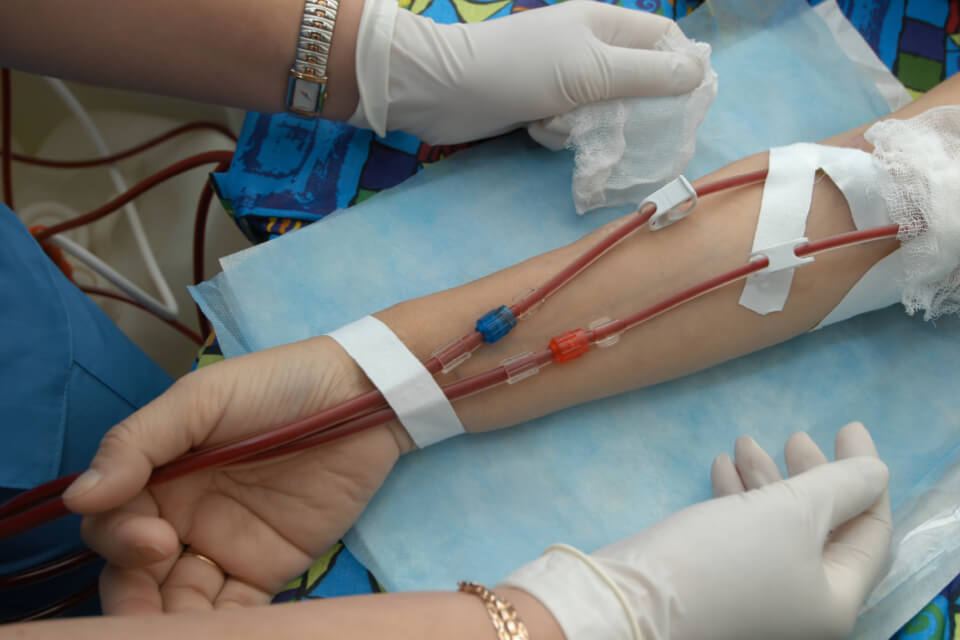What to Know
Hemorrhoid Artery Embolization (HAE) is specifically recommended only for patients with Grade 1 or Grade 2 hemorrhoids that have recurred after previous treatments, whether surgical or non-surgical. If this describes your experience, HAE may be a highly effective alternative to more invasive procedures. If you have not experienced recurring hemorrhoids after prior treatment, HAE is NOT an appropriate treatment option.
Our team of interventional radiologists offers HAE, a minimally invasive procedure that is safe, effective, and typically associated with less pain and discomfort than traditional surgery. The procedure is performed on an outpatient basis under mild sedation. Most patients can return to normal activities within a day or two, experiencing minimal discomfort.
Symptoms
Hemorrhoids are a common condition that can cause a range of uncomfortable symptoms. Below are some of the most common symptoms of hemorrhoids:
- Pain or discomfort, especially during bowel movements or when sitting for long periods.
- Itching or irritation, which can be exacerbated by sweating or exposure to moisture
- Bleeding during bowel movements, which can be seen on toilet paper or in the toilet bowl.
- Swelling which can make it difficult to sit or walk comfortably.
- Lump or bulge that forms around the anus, which can be painful or uncomfortable.
If you're experiencing any of these symptoms, it's important to talk to your doctor to determine the underlying cause and the best course of treatment.
Risk Factors:
While anyone can develop hemorrhoids, there are certain risk factors that can increase your likelihood of developing this condition. Here are some of the most common risk factors for hemorrhoids:
- Straining during bowel movements
- Pregnancy
- Obesity
- Sitting for long periods
- Age
- Family history
Some risk factors for hemorrhoids, such as age and family history, are beyond your control, but there are steps you can take to reduce your risk. These include maintaining a healthy weight, staying active, eating a high-fiber diet, and avoiding prolonged periods of sitting or standing.
Diagnoses
Hemorrhoids are typically diagnosed based on a patient's symptoms and a physical examination. During the examination, the healthcare professional will examine the anal area for swelling, inflammation, and other signs of hemorrhoids. They may also perform a digital rectal exam to feel for any abnormalities in the rectum. In some cases, your physician may order additional tests, such as an endoscopy, to help diagnose and grade the severity of the hemorrhoids and rule out other conditions.
At Richmond Vascular Center, we work closely with both the primary care physician and patient once they've been diagnosed with hemorrhoids, offering a consult and treatment plan before proceeding with the embolization.
Treatment
Treatment options may include lifestyle changes, such as increasing fiber intake and staying hydrated, over-the-counter creams and ointments, and non-surgical minimally invasive methods, such as hemorrhoid banding. In more severe cases, procedures such as Hemorrhoid Embolization may be recommended.
Hemorrhoid embolization is a minimally invasive procedure used to treat hemorrhoids, which are swollen and inflamed veins in the anus or lower rectum. The procedure involves blocking the blood supply to the hemorrhoidal tissue, which causes it to shrink and eventually disappear.
During the procedure, a small catheter is inserted into the radial artery in the wrist or femoral artery in the groin area and guided to the small arteries that supply blood to the hemorrhoidal tissue using x-ray technology. Tiny particles and/or coils are then placed into the arteries through the small catheter, which closes off the blood supply to the hemorrhoids.
Hemorrhoid embolization is typically performed on an outpatient basis and does not require general anesthesia. Patients may receive mild sedation or local anesthesia to manage any discomfort during the procedure. The procedure typically takes less than one hour, and patients return home the same day.
After the procedure, patients may experience some discomfort, including pain and rectal bleeding. However, these symptoms typically subside within a few days. Patients may also be advised to avoid heavy lifting and strenuous activity for several days after the procedure. In most cases, patients can return to work the following day.
Overall, hemorrhoid embolization is a safe and effective treatment option for hemorrhoids, and most patients can expect to experience relief from their symptoms within a few days of the procedure.
FAQ
What are the benefits of receiving hemorrhoid embolization treatment at Richmond Vascular Center?
As a trusted partner with an established reputation for excellence, Richmond Vascular Center provides high-quality care in a convenient, outpatient setting. With no overnight hospital stays required, procedures are both cost effective and efficient. Our expert physicians use proven methods to ensure patients return to normal activities with no pain and provide subspecialized support for wound treatment and prevention.
Will my insurance cover both the diagnostic tests and procedures done in the outpatient setting?
At Richmond Vascular Center, our patient-focused staff is committed to ensuring that all referrals and authorizations are completed prior to your initial visit.
In general, hemorrhoid embolization is considered a safe and effective treatment option for hemorrhoids. It is typically covered by insurance when it is deemed medically necessary, such as when other treatments have failed or when the hemorrhoids are causing significant discomfort or bleeding.
Who is a good candidate for hemorrhoid embolization?
Patients with Persistent Symptoms: Individuals with Grade 1 or Grade 2 hemorrhoids who continue to experience symptoms like bleeding, discomfort, and itching despite using dietary changes, fiber supplements, topical treatments, and other non-surgical interventions.
Patients Seeking Minimally Invasive Options: Individuals with Grade 1 or Grade 2 hemorrhoids who prefer a minimally invasive procedure over traditional surgical method. HAE offers the benefit of a shorter recovery period and potentially fewer complications.
Patients with Recurrent Hemorrhoids: Those with Grade 1 or Grade 2 hemorrhoids that recur after previous treatments, both surgical and non-surgical, may find HAE to be a beneficial alternative.
Each candidate should be assessed by a healthcare professional to determine the best treatment plan based on the severity of their hemorrhoids, overall health, and response to previous treatments.
Are you a candidate?
Are You a Candidate for Hemorrhoid Artery Embolization (HAE)?
HAE is specifically recommended only for patients with Grade 1 or Grade 2 hemorrhoids that have recurred after previous treatments, whether surgical or non-surgical. If this describes your experience, HAE may be a highly effective alternative to more invasive procedures.
Important: If you have not experienced recurring hemorrhoids after prior treatment, HAE is NOT an appropriate treatment option.
Ideal Candidates for HAE
- Patients with Persistent, Recurrent Symptoms:
Individuals with Grade 1 or Grade 2 hemorrhoids who continue to experience symptoms like bleeding, discomfort, and itching—even after prior treatments, such as dietary changes, fiber supplements, topical treatments, or surgical interventions. - Patients Seeking Minimally Invasive Options:
Those who meet the above criteria and are looking for a less invasive procedure than traditional surgery. HAE offers the advantage of outpatient treatment, a shorter recovery period, and fewer potential complications.
Assessment & Treatment Planning
Every patient must be thoroughly evaluated by a healthcare professional to confirm that HAE is the best course of action. This includes reviewing the severity of hemorrhoids, overall health status, and response to previous treatments to ensure suitability for the procedure.
placeholder

From the moment I walked into the door everyone was kind, friendly and professional. Having just completed the procedure, I couldn't be happier with the outcome. I HIGHLY RECOMMEND this wonderful team.




